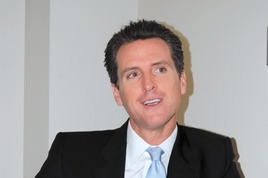The California Supreme Court has less than a month to issue its ruling on Proposition 8, and San Francisco Mayor Gavin Newsom — whose decision to issue marriage licenses to same-sex couples five years ago set Prop. 8 in motion — has not wavered in his confidence that, with or without a favorable court ruling, the Sunshine State will eventually see marriage equality.
Newsom was in Philadelphia last Saturday to accept Equality Forum’s 14th-annual International Role Model Award at the International Equality Dinner.
Newsom, 42, has become one of the most recognizable ally voices on marriage equality since February 2004, when he directed the San Francisco city clerk to issue marriage licenses to same-sex couples. Newsom said he was motivated to take that action following the 2000 voter-approved Proposition 22 ballot measure that banned same-sex marriage in the constitution.
“The whole idea was to frame the debate by putting a human face on it,” Newsom told PGN. “You can’t advance a constitutional amendment to write discrimination into the constitution without doing it with a sense of responsibility that this isn’t about a constitution, it’s about human beings, friends and family members, loved ones. That was the whole idea. But never did we imagine that a month would go by and 4,036 other couples would be married from 48 states and eight countries.”
The California Supreme Court placed a halt on the marriages in March and several months later invalidated all of the same-sex marriages performed during that time.
Several of the couples launched lawsuits against the state, which led to last year’s Supreme Court ruling that overturned Prop. 22 and legalized same-sex marriage.
About 18,000 same-sex couples tied the knot in the state last year before voters approved Prop. 8 in November, again barring same-sex marriage.
Newsom said that while he hadn’t foreseen the wide-ranging effects of his 2004 decision, he was prepared for the backlash his directive would ignite, which he said he felt from all sides.
“I certainly understood the controversy it would create. And the controversy incidentally was hardly just from the religious right or the more conservative parts of the country,” Newsom said. “It came from all parties, from elders and leaders throughout my party that were very much upset that we were moving forward. People were making the same arguments that we were moving too much, too fast, too soon and that we should just be patient and one day somehow things would start to take shape. It was a remarkable reaction early on.”
Late last month, Newsom announced his bid to run for governor of the state and will face nine other Democratic candidates, including former California governor and current state attorney general Jerry Brown, who argued for the overturning of Prop. 8, in the June primary.
Newsom said that, if elected, he would “certainly sign [marriage-equality] legislation in a second.”
“We’ve watched Gov. Schwarzenegger not once, but twice, veto marriage equality,” he said. “That’s pretty remarkable when you consider that he’s advanced, at least rhetorically, in his perspective of inclusivity and antidiscrimination. He was given the rare opportunity to not pass it just once but twice and to make up for his mistake, but he twice rejected it.”
The future of marriage equality in California now lies with the state Supreme Court, which has until June 3 to issue its ruling on several lawsuits, including one from the city of San Francisco, that charge that Prop. 8 was passed unconstitutionally. Marriage-equality advocates argue that the ballot measure should have been considered a constitutional revision — a major revision that would have required approval by the state legislature before being posed to voters — rather than an amendment. Brown also asserted that the court needs to evaluate whether Prop. 8 overrode “inalienable rights” that same-sex couples have, which he contended it did.
If the court upholds Prop. 8, Newsom said marriage-equality advocates must again pose the question of same-sex marriage to the public.
“There’s only one strategy: We have to go back in front of the voters. We don’t have any other choice because what the voters did is change a constitution to make any law — even one passed through the legislature and signed by the governor — that would contravene that constitution unconstitutional. So we’ll have to go in front of voters again to change that constitution back; isn’t that ironic? But it’s inevitable; we’d work to fight to advance another initiative. It’s a terrible thing because the whole idea of extending to the voters the rights of a minority to determine their fate is exactly why we have a constitution and courts. But we’re compelled by the nature of the constitutional amendment that was promoted and advanced by voters to do that.”
While many legal experts have proffered that the court is likely to uphold Prop. 8, Newsom said the court could also hand down a middle-of-the-road ruling.
“You never know what could happen,” he said. “There’s a lot of speculation, perhaps more idle than real, that the Supreme Court could issue a decision that opens up a door to a third option. You never know with this court. But they are sitting on this longer than people expected.”
Jen Colletta can be reached at [email protected].

